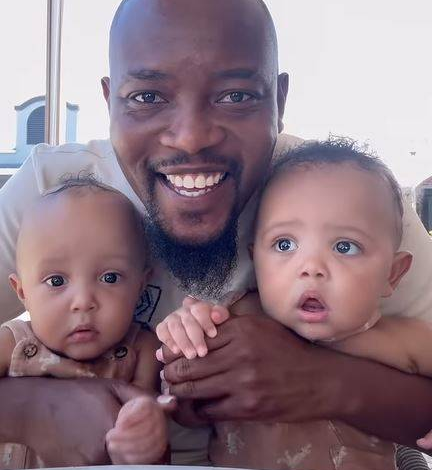
In a poignant exploration of the intricacies of surrogacy, Moshe Ndiki’s experience has shed light on the emotional complexities faced by both intended parents and surrogate mothers.
Amidst the joy of welcoming twins into his life, Moshe has found himself navigating a delicate situation as his surrogate struggles to come to terms with the fact that the twins belong to him and not her.

The story has sparked a broader discussion on the nature of parental bonds and the ethical considerations surrounding surrogacy.
Moshe Ndiki, a beloved figure in the South African entertainment industry, recently became a father to twins through surrogacy, fulfilling a long-held dream of parenthood. While the arrival of the twins brought immense joy and fulfillment to Moshe’s life, it also exposed the emotional complexities inherent in the surrogacy process.
The surrogate, whose identity remains undisclosed, played a pivotal role in bringing Moshe’s dream of parenthood to fruition. However, as the biological mother of the twins, she found herself grappling with conflicting emotions upon their birth. Despite her role as a gestational carrier, she struggled to reconcile her biological connection to the twins with the reality that they belonged to Moshe.
The situation highlights the nuanced dynamics that can arise in surrogacy arrangements, where the boundaries between biological ties and parental rights can become blurred.
While surrogates typically enter into agreements with the understanding that they are carrying a child for someone else, the emotional bond formed during pregnancy can complicate matters, leading to feelings of attachment and possessiveness.
For Moshe, navigating the delicate balance between gratitude for the surrogate’s role in his journey to parenthood and asserting his rights as the children’s legal father has proven challenging. While he remains grateful for her selflessness and sacrifice, he is also mindful of the need to establish clear boundaries and protect his role as the twins’ parent.
The situation has sparked a broader conversation about the ethical considerations surrounding surrogacy and the need for greater support and guidance for all parties involved. Surrogacy agreements often focus on legal and logistical aspects, but the emotional well-being of both intended parents and surrogates is equally important and deserving of attention.
As Moshe and his surrogate navigate the complexities of their relationship in the aftermath of the twins’ birth, their story serves as a reminder of the profound impact that surrogacy can have on the lives of all involved. While it is a journey fraught with challenges and uncertainties, it also offers the possibility of creating new families and fulfilling long-held dreams of parenthood.
In the end, Moshe Ndiki’s experience serves as a catalyst for greater awareness and understanding of the emotional complexities of surrogacy. By sharing his story with openness and honesty, he invites us to contemplate the nature of parental bonds and the profound ways in which they are forged, transcending biological ties and legal agreements to encompass love, compassion, and mutual respect.



0 Comments